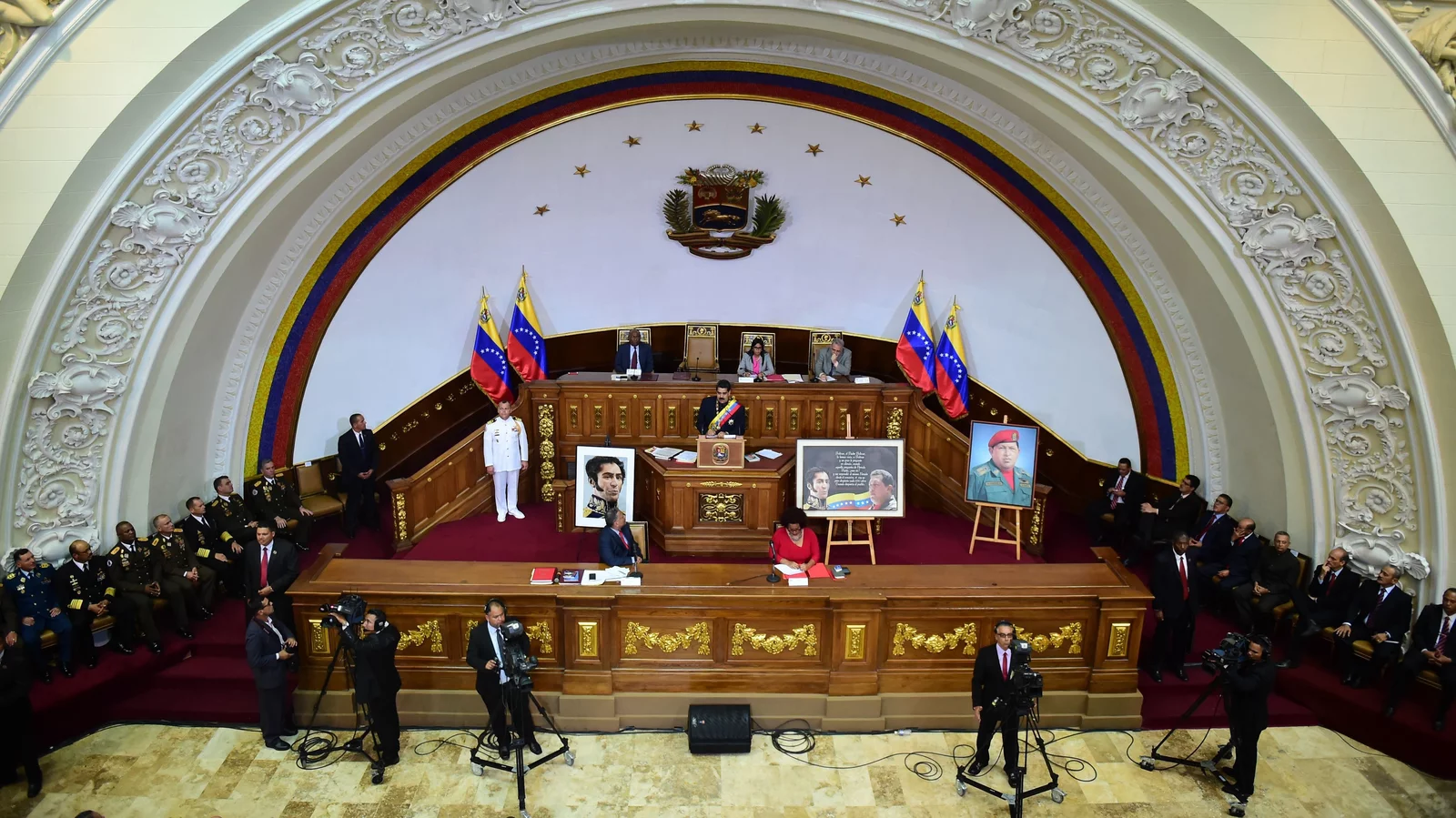
The National Constituent Assembly Creation
Venezuela was once seen as a country that seemed to be on the right track to democracy in Latin America, but that changed when Hugo Chavez took power in 1999. During Chavez’s reign from 1999-2013, a future democracy was eroded and eventually disappeared through a number of actions Chavez took, including the arrest of political opponents and purges of the bureaucracy. However, the opposition also played a part in Chavez’s rise to power, especially in their decision to boycott the 2005 legislative elections, allowing his party to win all of the seats and pass any legislation they wanted. These actions eventually culminated in a referendum that passed in 2009, which eliminated term limits, completing Venezuela’s democratic erosion. When Chavez died in 2013, his handpicked successor, Nicolas Maduro, narrowly won the presidency. However, in 2015, the opposition parties won a majority of seats in the National Assembly, Venezuela’s national legislative body. Many international observers, and even the Venezuelan opposition, thought this signaled victory over Maduro and his forces. However, they were wrong. Maduro was able to use his executive powers and control of the state agencies, as well as the loyalists previously appointed to the Supreme Court, to create a new legislature called the National Constituent Assembly. Maduro used the Supreme Court to weaken the power of the opposition controlled national assembly, and was then able to create a legislature that is under the control of Maduro loyalists.
The National Constituent Assembly granted itself the power to decree laws. They also claimed the power to legislate on issues of peace, security, sovereignty, and the social and economic system. The Assembly has affirmed its loyalty to President Maduro by accusing opposition leaders of treason and vowing to put them on trial.
One of democracy’s most critical features is accountability, both horizontally and vertically. Horizontal accountability is the ability for legislative and judicial institutions to regulate the executive, essentially a system of checks of balances. By creating this new legislature, Maduro eliminated any options for horizontal accountability. Vertical accountability is gained through the ballot box, when voters express support in your policies by voting for you. In the 2015 elections, the opposition parties won 99 out of 167 seats,rejecting Maduro and the policies his party was for. Maduro also eliminated vertical accountability by creating this new legislature, as he rejected the will of the people in an attempt to stay in power. The loss of vertical and horizontal accountability are clear signs of democratic erosion in Venezuela.
Maduro was able to do this because Venezuela had a key indicator of competitive authoritarianism; politicized state institutions. In their paper Rising Competitive Authoritarianism in Turkey, Esen and Gumuscu explain that there are three major indicators composing a uneven playing field which are the politicized state institutions, a country where there is uneven access to media, and an uneven access to resources. In Venezuela, Maduro already controlled the courts and bureaucracy, so there was no resistance to his plan to create this new legislature. In many cases of democratic erosion around the world, the courts and bureaucracy have played a key role in stopping democratic erosion, especially in Columbia, where the Constitutional Court ruled against allowing President Uribe to run for a third term.
Maduro also recognized that the creation of this legislature would result in fierce pushback from the opposition, and knew it was important to get allies such as the army on his side. Using the powers of the state for a political purpose, Maduro appointed General Manuel Quevedo as the president of Venezuela’s state oil company PDVSA and also gave him the governmental role of minister of oil. In many countries, the opposition has succeeded in fighting back against democratic erosion because of the support of the army. With Maduro destroying that option here, the opposition lacked any institutional allies and therefore had to resort to extra-institutional means that have been proven to be ineffective, such as protests on the street that ultimately failed.
However, the most important aspect in fighting democratic erosion if you are the opposition is to stay united, and through the creation of this legislature, Maduro was able to divide the opposition, weakening them and making his position stronger. After the formation of this new legislature, the opposition, once united, is choosing to go in different directions, making them weaker to the unified Maduro government. Some opposition leaders in Venezuela are recognizing the government legislature and negotiating with them, while others are not.
In the end, Nicolas Maduro’s creation of the National Constituent Assembly, and his strategies before and after its implementation to ensure it would be successful and demobilize the opposition worked, as he retained his hold on power and continues to cling to it to this day, even though it had looked promising for the opposition after the 2015 legislative elections. Venezuela is an important reminder that autocrats are willing to do anything to stay in power, and without institutional resources and a strong united opposition, resistance to democratic erosion is likely to fail or have very little impact.

The author does a great job at opening this article by highlighting how the country of Venezuela was on the “right track” in terms of Democracy. This track unfortunately seemed to change once Hugo Chavez took power in 1999. The article then further goes into depth in explaining how the National Constituent Assembly has changed rules between the years of 2009 and 2015, thus impacting the direction in which the country steers in regards to a political dominance. Accountability is said by this author to be “one of democracys most critical features”, and it is demonstrated in the way Nicolas Maduro ran Venezuela when the country was in his hands, and this article supports that idea well.